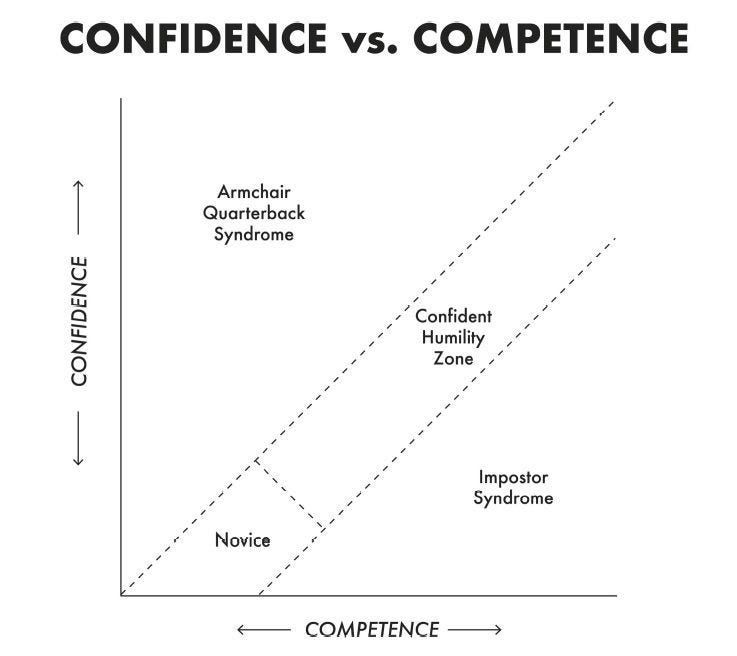Whenever asked about imposter syndrome, my default answer has been that I don’t think I’ve ever experienced it. (Case in point: listen to the conversation I had with Ross Hatton, timestamp: 48:44.) That’s mostly because of what I understood imposter syndrome to be:
- By definition, an imposter is “a person who pretends to be someone else in order to deceive others, especially for fraudulent gain.” I’ve never pretended to be someone else to deceive others.
- By definition, imposter syndrome is when “people doubt their skills, talents, or accomplishments, despite external evidence of their competence.” I’ve typically had confidence in my competence, largely because I also have enough objective evidence of where I’m incompetent that I can clearly spot the difference.
In her fantastic article “If you want to be creative, you can’t be certain,” Ida Persson paraphrases Seth Godin’s thoughts on imposter syndrome:
Everyone who is doing important work is working on something that might not work. And when things might not work, you’re acting as if. And that makes you an imposter.
I can get down with the idea that an imposter is “someone who acts as if.” By that definition, I’ve definitely been an imposter. The difference is that I’ve been an imposter on purpose.
Being an imposter on purpose can be a useful part of being a designer. A designer’s job is partially to imagine a world that doesn’t exist and work to make that world a reality. In other words: to act as if. Travis Kalanick and Garrett Camp had to act as if we live in a world where it’s acceptable to get into strangers’ cars, and Uber was born. Brian Chesky, Nathan Blecharczyk, and Joe Gebbia had to act as if we live in a world where it’s acceptable to stay in strangers’ houses, and Airbnb was born.
Thinking about it in this way helps me to realize that imposter syndrome sometimes goes by different names. Delusional. Zealous. Visionary. All things that are strengths as much as they are weaknesses.
Choosing to be someone different than who you are can be a powerful strategy, as Todd Herman describes in his book, The Alter Ego Effect. Having an alter ego can help you achieve and attain skills, traits, and qualities you may not want or be able to associate with the real you. Bruce Wayne’s Batman alter ego helps him beat criminals to a pulp. Sasha Fierce. Ziggy Stardust. Black Mamba. Hannah Montana.
One alter ego technique my wife and I use all the time in our house is to try on the persona of a person who has made a certain decision. For example, if we were trying to decide to sell one of our two cars to try and live with one car, we might pretend to be a family that has only one car when we go to bed. When we wake up, we’d wake up in the mindset of a family that has only one car. We might even take it further and ignore one of our cars for the week to see how it feels to be that kind of family. It’s like a new outfit you can try on to see if it fits.
This gives a different meaning to another phrase/idea I’ve historically detest: “fake it til you make it.” Assuming an alter ego lets you try on an idea without becoming it. There’s nothing fake about that. Imposter syndrome gets people down when they suddenly realize they feel like someone else; it’s the surprise part that’s jarring about it.
I appreciate Adam Grant’s framing on imposter syndrome in his book, Think Again:
In theory, confidence and competence go hand in hand. In practice, they often diverge.
As Grant describes it, imposter syndrome is where competence exceeds confidence.

The way to combat imposter syndrome—and it’s counterpoint, Armchair Quarterback Syndrome—is to balance confidence and competence.
When my confidence has been lower than my competence, I’ve questioned whether my achievements in that area are largely due to luck. A few years in, my agency SuperFriendly broke a million dollars in revenue. So, am I a person who can create million dollar companies? Technically yes. But it doesn’t feel like it to me. Pardon the pedantry, but “a person who can create million dollar companies” is different than “a person who created a million dollar company that one time.”
The next year, SuperFriendly broke a million dollars in revenue again (well, two million, to be exact). So now am I a person who can create million dollar companies? Again, technically yes, but it still doesn’t feel like it. Because maybe it was just riding on the momentum of the previous year. You can see how my confidence being lower than my competence leaves room for imposter syndrome.
So before I leap to that judgment, I’m trying to do it again with a completely different company. If I can do it three times, that’s usually enough evidence for me to believe that it’s not luck; it’s me.
Read Next
The Journey to a Dream Client
Join 62,700+ subscribers to the weekly Dan Mall Teaches newsletter. I promise to keep my communication light and valuable!